(完整word版)高考英语短文改错常见错误类型分析
- 格式:doc
- 大小:40.01 KB
- 文档页数:2
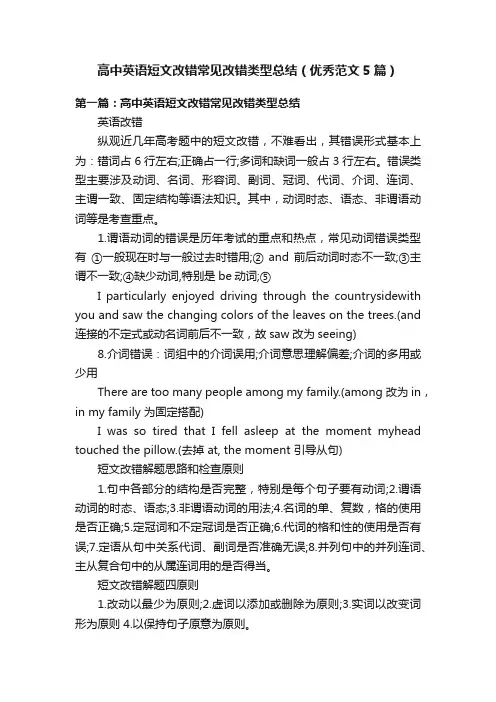
高中英语短文改错常见改错类型总结(优秀范文5篇)第一篇:高中英语短文改错常见改错类型总结英语改错纵观近几年高考题中的短文改错,不难看出,其错误形式基本上为:错词占6行左右;正确占一行;多词和缺词一般占3行左右。
错误类型主要涉及动词、名词、形容词、副词、冠词、代词、介词、连词、主谓一致、固定结构等语法知识。
其中,动词时态、语态、非谓语动词等是考查重点。
1.谓语动词的错误是历年考试的重点和热点,常见动词错误类型有①一般现在时与一般过去时错用;② and 前后动词时态不一致;③主谓不一致;④缺少动词,特别是be动词;⑤I particularly enjoyed driving through the countrysidewith you and saw the changing colors of the leaves on the trees.(and 连接的不定式或动名词前后不一致,故saw改为seeing)8.介词错误:词组中的介词误用;介词意思理解偏差;介词的多用或少用There are too many people among my family.(among 改为in,in my family 为固定搭配)I was so tired that I fell asleep at the moment myhead touched the pillow.(去掉 at, the moment 引导从句)短文改错解题思路和检查原则1.句中各部分的结构是否完整,特别是每个句子要有动词;2.谓语动词的时态、语态;3.非谓语动词的用法;4.名词的单、复数,格的使用是否正确;5.定冠词和不定冠词是否正确;6.代词的格和性的使用是否有误;7.定语从句中关系代词、副词是否准确无误;8.并列句中的并列连词、主从复合句中的从属连词用的是否得当。
短文改错解题四原则1.改动以最少为原则;2.虚词以添加或删除为原则;3.实词以改变词形为原则4.以保持句子原意为原则。
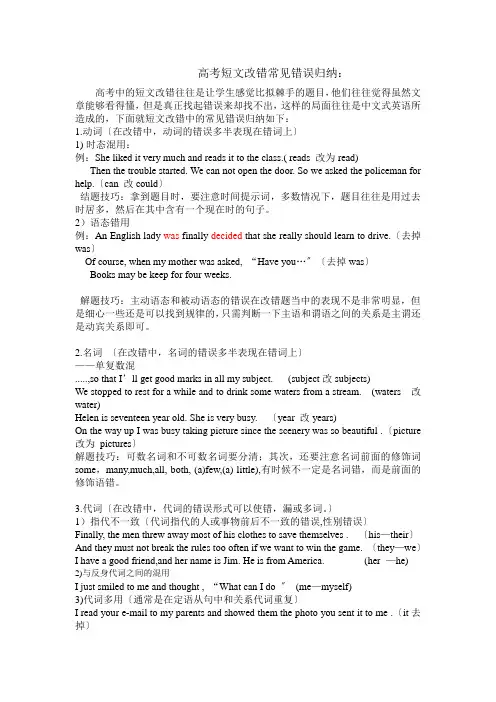
高考短文改错常见错误归纳:高考中的短文改错往往是让学生感觉比拟棘手的题目,他们往往觉得虽然文章能够看得懂,但是真正找起错误来却找不出,这样的局面往往是中文式英语所造成的,下面就短文改错中的常见错误归纳如下:1.动词〔在改错中,动词的错误多半表现在错词上〕1)时态混用:例:She liked it very much and reads it to the class.( reads 改为read) Then the trouble started. We can not open the door. So we asked the policeman for help.〔can 改could〕结题技巧:拿到题目时,要注意时间提示词,多数情况下,题目往往是用过去时居多,然后在其中含有一个现在时的句子。
2)语态错用例:An English lady was finally decided that she really should learn to drive.〔去掉was〕Of course, when my mother was asked, “Have you…〞〔去掉was〕Books may be keep for four weeks.解题技巧:主动语态和被动语态的错误在改错题当中的表现不是非常明显,但是细心一些还是可以找到规律的,只需判断一下主语和谓语之间的关系是主谓还是动宾关系即可。
2.名词〔在改错中,名词的错误多半表现在错词上〕——单复数混.....,so that I’ll get good marks in all my subject. (subject改subjects)We stopped to rest for a while and to drink some waters from a stream. (waters 改water)Helen is seventeen year old. She is very busy. 〔year 改years)On the way up I was busy taking picture since the scenery was so beautiful .〔picture 改为pictures〕解题技巧:可数名词和不可数名词要分清;其次,还要注意名词前面的修饰词some,many,much,all, both, (a)few,(a) little),有时候不一定是名词错,而是前面的修饰语错。
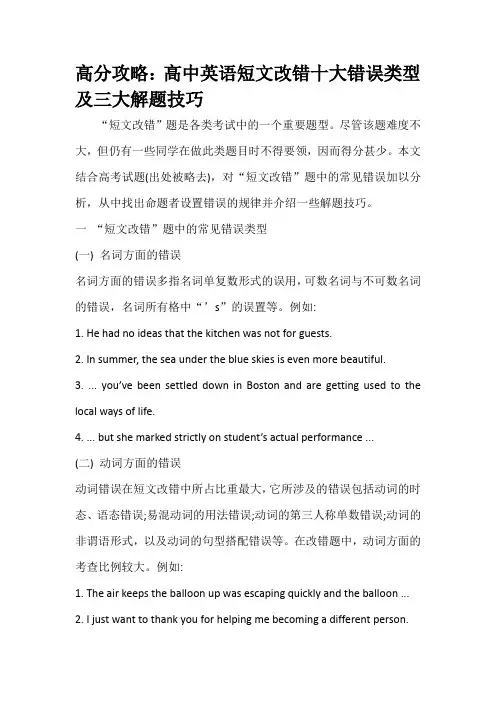
高分攻略:高中英语短文改错十大错误类型及三大解题技巧“短文改错”题是各类考试中的一个重要题型。
尽管该题难度不大,但仍有一些同学在做此类题目时不得要领,因而得分甚少。
本文结合高考试题(出处被略去),对“短文改错”题中的常见错误加以分析,从中找出命题者设置错误的规律并介绍一些解题技巧。
一“短文改错”题中的常见错误类型(一) 名词方面的错误名词方面的错误多指名词单复数形式的误用,可数名词与不可数名词的错误,名词所有格中“’s”的误置等。
例如:1. He had no ideas that the kitchen was not for guests.2. In summer, the sea under the blue skies is even more beautiful.3. ... you’ve been settled down in Boston and are getting used to the local ways of life.4. ... but she marked strictly on student’s actual performance ...(二) 动词方面的错误动词错误在短文改错中所占比重最大,它所涉及的错误包括动词的时态、语态错误;易混动词的用法错误;动词的第三人称单数错误;动词的非谓语形式,以及动词的句型搭配错误等。
在改错题中,动词方面的考查比例较大。
例如:1. The air keeps the balloon up was escaping quickly and the balloon ...2. I just want to thank you for helping me becoming a different person.3. How about join us? The camp is at the foot of a small hill.4. I’ll send my friend Charlie meet you at the airport.(三) 形容词、副词方面的错误这类错误多指误用形容词修饰形容词,误用副词修饰名词,误用形容词修饰动词,误用形容词或副词的原级、比较级和最高级以及误用带-ly的副词与不带-ly的副词等,特别注意根据上下文该用比较级而未用的“暗中比较”。
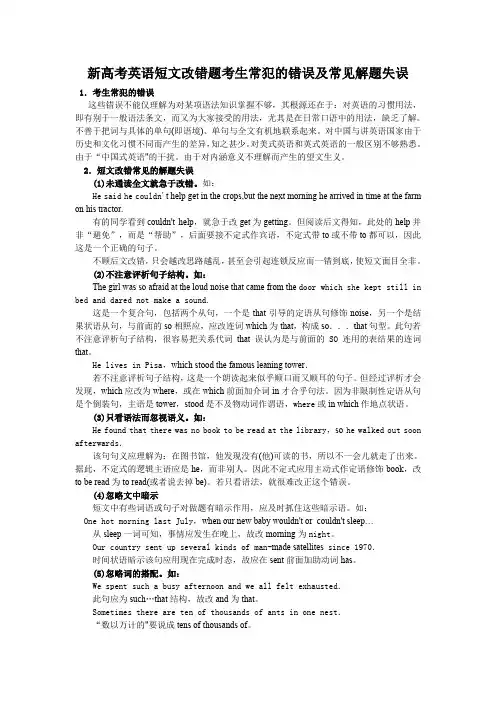
新高考英语短文改错题考生常犯的错误及常见解题失误1.考生常犯的错误这些错误不能仅理解为对某项语法知识掌握不够,其根源还在于:对英语的习惯用法,即有别于一般语法条文,而又为大家接受的用法,尤其是在日常口语中的用法,缺乏了解。
不善于把词与具体的单句(即语境)、单句与全文有机地联系起来。
对中国与讲英语国家由于历史和文化习惯不同而产生的差异,知之甚少。
对美式英语和英式英语的一般区别不够熟悉。
由于“中国式英语"的干扰。
由于对内涵意义不理解而产生的望文生义。
2.短文改错常见的解题失误(1)未通读全文就急于改错。
如:He said he couldn't help get in the crops,but the next morning he arrived in time at the farm on his tractor.有的同学看到couldn't help,就急于改get为getting。
但阅读后文得知,此处的help并非“避免”,而是“帮助”,后面要接不定式作宾语,不定式带to或不带to都可以,因此这是一个正确的句子。
不顾后文改错,只会越改思路越乱,甚至会引起连锁反应而一错到底,使短文面目全非。
(2)不注意评析句子结构。
如:The girl was so afraid at the loud noise that came from the door which she kept still in bed and dared not make a sound.这是一个复合句,包括两个从句,一个是that引导的定语从句修饰noise,另一个是结果状语从句,与前面的so相照应,应改连词which为that,构成so...that句型。
此句若不注意评析句子结构,很容易把关系代词that误认为是与前面的SO连用的表结果的连词that。
He lives in Pisa,which stood the famous leaning tower.若不注意评析句子结构,这是一个朗读起来似乎顺口而又顺耳的句子。
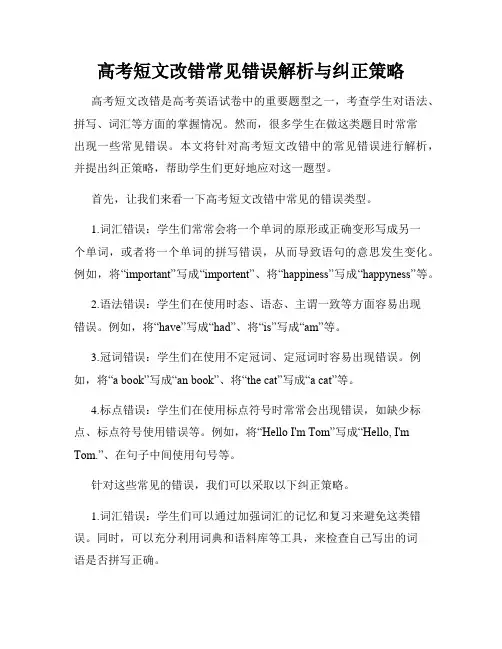
高考短文改错常见错误解析与纠正策略高考短文改错是高考英语试卷中的重要题型之一,考查学生对语法、拼写、词汇等方面的掌握情况。
然而,很多学生在做这类题目时常常出现一些常见错误。
本文将针对高考短文改错中的常见错误进行解析,并提出纠正策略,帮助学生们更好地应对这一题型。
首先,让我们来看一下高考短文改错中常见的错误类型。
1.词汇错误:学生们常常会将一个单词的原形或正确变形写成另一个单词,或者将一个单词的拼写错误,从而导致语句的意思发生变化。
例如,将“important”写成“importent”、将“happiness”写成“happyness”等。
2.语法错误:学生们在使用时态、语态、主谓一致等方面容易出现错误。
例如,将“have”写成“had”、将“is”写成“am”等。
3.冠词错误:学生们在使用不定冠词、定冠词时容易出现错误。
例如,将“a book”写成“an book”、将“the cat”写成“a cat”等。
4.标点错误:学生们在使用标点符号时常常会出现错误,如缺少标点、标点符号使用错误等。
例如,将“Hello I'm Tom”写成“Hello, I'm Tom.”、在句子中间使用句号等。
针对这些常见的错误,我们可以采取以下纠正策略。
1.词汇错误:学生们可以通过加强词汇的记忆和复习来避免这类错误。
同时,可以充分利用词典和语料库等工具,来检查自己写出的词语是否拼写正确。
2.语法错误:学生们可以通过加强语法知识的学习和理解来纠正这类错误。
特别是需要注意时态、语态、主谓一致等语法知识点的正确运用。
此外,多阅读英语文章和写作练习也能帮助学生们提高语法水平。
3.冠词错误:学生们可以通过阅读和积累大量的英语文章来提高冠词的正确使用。
另外,可以通过模仿和仿写来训练自己对冠词的掌握。
4.标点错误:学生们可以通过多读英语文章和练习来提高标点符号的正确使用。
此外,也可以请教老师或同学来帮助自己检查标点使用的准确性。
![高考英语短文改错常见错误类型[1]](https://uimg.taocdn.com/22488e641ed9ad51f01df284.webp)
高考英语短文改错常见错误类型高考英语改错题是考生感到棘手的题型之一。
笔者对近几年的高考英语改错题作了细致的分析并加以归类后,发现错误类型主要集中在以下方面。
(例题保留原题号)1. 动词时态每年都有时态错误的小题,而且改动基本集中在一般过去时与一般现在时之间。
时态的更改要以上下文的主体时态为依据。
(1)(2003全国卷)She liked it very much and reads it to the class. All said the story was... 84. read (and连接并列谓语)(2)(2004江苏卷)At once I apologize and controlled myself... 83. apologized(and连接并列谓语)(3)(2004全国卷)Sometimes, we talked to each other very well in class,... 82. talk(根据sometimes可判断此句为一般现在时)(4)(2005全国卷Ⅱ)I will write again and send you the photos we take together. 85. took(把照片寄给你,应该是已经拍好的,用过去时)(5)(2005全国卷Ⅰ)There are advantage for students to work while studying at school. One of them was that they can earn money. 77. is(从上下文判断,应该是现在时,谓语用is)(6)(2005江苏卷)We named him Jack and keep him for about three years. 76. kept(and连接并列谓语)2. 名词单复数单复数互改是高考英语改错题的基本题型之一,改动的依据有:一是根据名词前的修饰限定成份;二是根据上下文的逻辑关系。
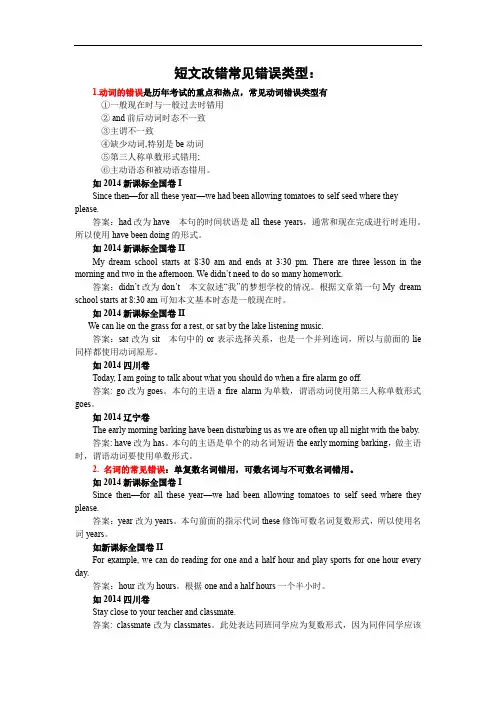
短文改错常见错误类型:1.动词的错误是历年考试的重点和热点,常见动词错误类型有①一般现在时与一般过去时错用② and前后动词时态不一致③主谓不一致④缺少动词,特别是be动词⑤第三人称单数形式错用;⑥主动语态和被动语态错用。
如2014新课标全国卷ISince then—for all these year—we had been allowing tomatoes to self seed where they please.答案:had改为have 本句的时间状语是all these years,通常和现在完成进行时连用。
所以使用have been doing的形式。
如2014新课标全国卷IIMy dream school starts at 8:30 am and ends at 3:30 pm. There are three lesson in the morning and two in the afternoon. We didn’t need to do so many homework.答案:didn’t改为don’t 本文叙述“我”的梦想学校的情况。
根据文章第一句My dream school starts at 8:30 am可知本文基本时态是一般现在时。
如2014新课标全国卷IIWe can lie on the grass for a rest, or sat by the lake listening music.答案:sat改为sit 本句中的or表示选择关系,也是一个并列连词,所以与前面的lie 同样都使用动词原形。
如2014四川卷Today, I am going to talk about what you should do when a fire alarm go off.答案: go改为goes。
本句的主语a fire alarm为单数,谓语动词使用第三人称单数形式goes。
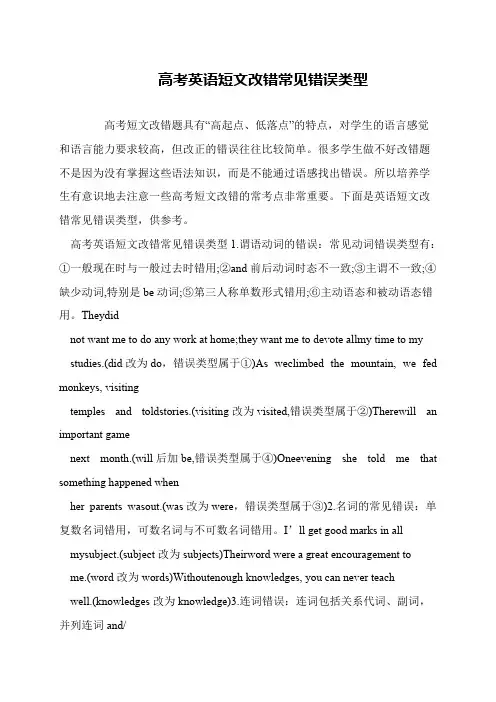
高考英语短文改错常见错误类型 高考短文改错题具有“高起点、低落点”的特点,对学生的语言感觉和语言能力要求较高,但改正的错误往往比较简单。
很多学生做不好改错题不是因为没有掌握这些语法知识,而是不能通过语感找出错误。
所以培养学生有意识地去注意一些高考短文改错的常考点非常重要。
下面是英语短文改错常见错误类型,供参考。
高考英语短文改错常见错误类型1.谓语动词的错误:常见动词错误类型有:①一般现在时与一般过去时错用;②and前后动词时态不一致;③主谓不一致;④缺少动词,特别是be动词;⑤第三人称单数形式错用;⑥主动语态和被动语态错用。
Theydid not want me to do any work at home;they want me to devote allmy time to my studies.(did改为do,错误类型属于①)As weclimbed the mountain, we fed monkeys, visiting temples and toldstories.(visiting改为visited,错误类型属于②)Therewill an important game next month.(will后加be,错误类型属于④)Oneevening she told me that something happened when her parents wasout.(was改为were,错误类型属于③)2.名词的常见错误:单复数名词错用,可数名词与不可数名词错用。
I’ll get good marks in all mysubject.(subject改为subjects)Theirword were a great encouragement to me.(word改为words)Withoutenough knowledges, you can never teach well.(knowledges改为knowledge)3.连词错误:连词包括关系代词、副词,并列连词and/。
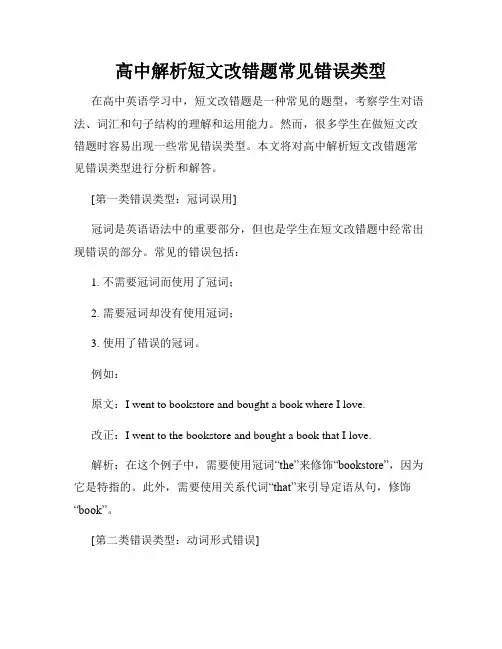
高中解析短文改错题常见错误类型在高中英语学习中,短文改错题是一种常见的题型,考察学生对语法、词汇和句子结构的理解和运用能力。
然而,很多学生在做短文改错题时容易出现一些常见错误类型。
本文将对高中解析短文改错题常见错误类型进行分析和解答。
[第一类错误类型:冠词误用]冠词是英语语法中的重要部分,但也是学生在短文改错题中经常出现错误的部分。
常见的错误包括:1. 不需要冠词而使用了冠词;2. 需要冠词却没有使用冠词;3. 使用了错误的冠词。
例如:原文:I went to bookstore and bought a book where I love.改正:I went to the bookstore and bought a book that I love.解析:在这个例子中,需要使用冠词“the”来修饰“bookstore”,因为它是特指的。
此外,需要使用关系代词“that”来引导定语从句,修饰“book”。
[第二类错误类型:动词形式错误]动词形式错误也是高中短文改错题中的常见错误类型之一。
常见的错误包括:1. 动词时态错误;2. 动词主谓不一致;3. 动词形式错误(过去分词形式、现在分词形式等)。
例如:原文:Yesterday, Mary go to the supermarket and buy some vegetables.改正:Yesterday, Mary went to the supermarket and bought some vegetables.解析:在这个例子中,需要使用一般过去时态的动词形式“went”,因为动作发生在过去。
此外,需要使用过去式“bought”来描述过去发生的购买行为。
[第三类错误类型:词性误用]词性误用也是一个常见的错误类型。
学生容易将名词误用为动词、形容词误用为副词等。
常见的错误包括:1. 名词误用为动词;2. 形容词误用为副词;3. 名词误用为形容词。
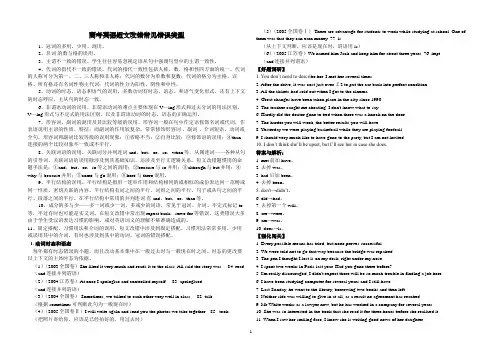
高考英语短文改错常见错误类型1、冠词的多用、少用、混用。
2、名词的数与格的误用。
3、主谓不一致的错误。
学生往往容易忽视定语从句中强调句型中的主谓一致性。
4、代词的指代不一致的错误。
代词的指代一致性包括人称、数、格和性四方面的统一。
代词的人称可分为第一、二、三人称和非人称;代词的数分为单数和复数;代词的格分为主格、宾格、所有格还有名词性物主代词;代词的性分为阳性、阴性和中性。
5、动词的时态、语态和语气的误用。
多数动词有时态、语态、和语气变化形式,还有上下文的时态呼应,主从句的时态一致。
6、非谓语动词的误用。
非谓语动词的难点主要体现在V—ing形式和过去分词的用法区别、V—ing形式与不定式的用法区别、以及非谓语动词的时态、语态的正确运用。
7、形容词、副词的混用及其比较等级的误用。
形容词一般在句中作定语修饰名词或代词,作表语说明主语的性质、特征;而副词的作用较复杂,常常修饰形容词、副词、介词短语、动词或全句。
形容词和副词比较等级的误用现象:①省略不当;②自身比较;③修饰语的误用;④than 连接的两个比较对象不一致或不平行。
8、关联词语的误用。
关联词分并列连词 and,but,or,so,when等,从属连词——各种从句的引导词。
关联词语的误用除涉及到其基础知识,还涉及至行文逻辑关系。
短文改错题惯用的命题手法是:①and,but,or,so等之间的混用;②because与so并用;③although与but并用;④why 与because并用;⑤come与go混用;⑥here与there混用。
9、平行结构的误用。
平行结构是指用一连串作用和结构相同的或相似的成份表达同一范畴或同一性质、密切关联的内容。
平行结构有词之间的平行、词组之间的平行、句子或从句之间的平行、段落之间的平行。
在平行结构中常用的并列连词有and,but,or,than等。
10、成分的多与少——多一词或少一词。
多或少的词语,常见于冠词、介词、不定式标记to 等,不过有时也可能是实义词。
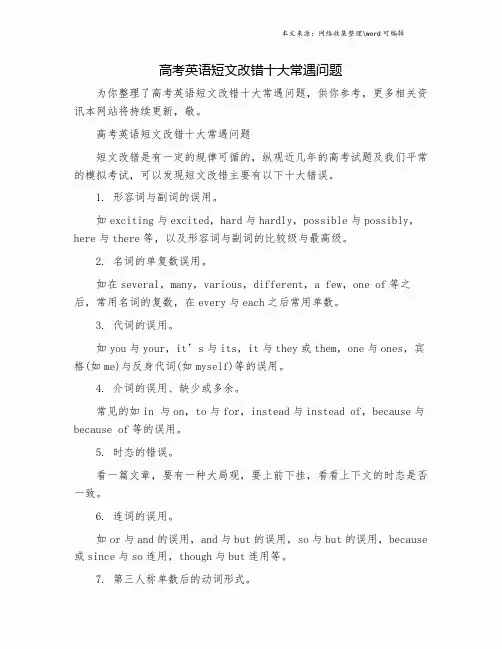
高考英语短文改错十大常遇问题为你整理了高考英语短文改错十大常遇问题,供你参考,更多相关资讯本网站将持续更新,敬。
高考英语短文改错十大常遇问题短文改错是有一定的规律可循的,纵观近几年的高考试题及我们平常的模拟考试,可以发现短文改错主要有以下十大错误。
1. 形容词与副词的误用。
如exciting与excited,hard与hardly,possible与possibly,here与there等,以及形容词与副词的比较级与最高级。
2. 名词的单复数误用。
如在several,many,various,different,a few,one of等之后,常用名词的复数,在every与each之后常用单数。
3. 代词的误用。
如you与your,it’s与its,it与they或them,one与ones,宾格(如me)与反身代词(如myself)等的误用。
4. 介词的误用、缺少或多余。
常见的如in 与on,to与for,instead与instead of,because与because of等的误用。
5. 时态的错误。
看一篇文章,要有一种大局观,要上前下挂,看看上下文的时态是否一致。
6. 连词的误用。
如or与and的误用,and与but的误用,so与but的误用,because 或since与so连用,though与but连用等。
7. 第三人称单数后的动词形式。
8. 一些固定结构的误用。
如so...that被误用作very...that,too...to被误用very...to,as...as被误作so...as等。
9. 定语从句中,which,that,when,where等混淆不清。
10. 一些常用词,如what与how,except与besides,any与some 以及它们的合成词如any-thing与something,anywhere与somewhere等混淆不清。
易烊千玺艺术统考成绩:表演类全省第6美术过线易烊千玺艺考成绩曝光:他竟然准备了两科我精心为您各学校202X高水平艺术团报名时间汇总各高校202X高水平运动队招生通过审核名单汇总202X各省美术统考考题汇总202X年美术统考、联考合格分数线汇总202X美术统考成绩查询时间及系统汇总202X年高考艺术类招生简章汇总202X年各省市音乐统考合格线汇总202X各省艺考合格线汇总全国各高校202X保送生招生简章汇总202X年各院校保送生报名时间及考试时间汇总202X优秀运动员免试入学招生简章汇总202X高考运动训练专业招生简章汇总202X年中国艺术生选哪些大学高考语文复习资料高考数学复习资料高考英语复习资料高考文综复习资料高考理综复习资料高考语文模拟试题高考数学模拟试题高考英语模拟试题高考文综模拟试题高考理综模拟试题高中学习方法高考复习方法高考状元学习方法高考饮食攻略高考励志名言。
短文改错常见错误原因分析短文改错是一个常见的英语学习和教学活动,通过检查和纠正学生写作中的错误,有助于提高学生的语言水平和写作能力。
在进行短文改错时,常见的错误可以分为以下几类,并针对不同的错误原因提出相应的分析和解决方法。
1. 词法错误词法错误包括拼写错误、词汇选择错误和词形错误等。
造成这类错误的原因主要是学生对词法规则不熟悉或者注意力不集中。
解决这类问题的方法包括加强词汇训练,提高对词汇的敏感度,并养成查字典、注意拼写的习惯。
2. 语法错误语法错误包括时态、语态、主谓一致、句型搭配等方面的错误。
这些错误的原因可能是学生对语法规则理解不深入、记忆不牢固,或者错误的应用了规则。
要解决这类问题,学生需要加强对语法知识的学习和消化,多做语法练习,积累正确的语法表达习惯。
3. 语篇错误语篇错误主要是指文章结构、连贯性和逻辑性等方面的问题,如句子之间的衔接不自然、段落过渡不流畅等。
造成这类错误的原因可能是学生写作经验不足,缺乏组织和表达的能力。
要解决这类问题,学生需要通过大量的阅读和写作练习来提高自己的写作技巧和表达能力。
4. 意思不明确或模糊这类错误包括表达不清楚、意思不明确等问题。
原因可能是学生思维不清晰、表达能力有限。
解决这类问题的方法是培养学生的逻辑思维和表达能力,鼓励学生多思考并结构化地表达自己的观点。
5. 文化差异引起的错误这类错误通常是由于学生对英语的文化背景不了解或者对中文思维习惯的影响。
解决这类问题的方法是帮助学生了解英语和中文的语言和文化差异,培养跨文化交际的能力。
总的来说,短文改错常见错误的原因主要包括词法不熟练、语法理解不深入、写作经验不足、思维不清晰等。
解决这些问题的关键在于加强相关知识的学习和掌握,多做练习和积累经验,并注重发展学生的逻辑思维和表达能力。
通过不断的训练和实践,学生可以逐渐提高自己的写作水平,减少犯错的机会。
高考英语短文改错常见错误类型归纳1. 动词1). 语态Charles and Linda were seeing near the top of the building.Great changes have been taken place in our school in the past few years.The books that you borrow may be keep for four weeks.Because of this, children may not be develop the habit of reading.2). 时态:要有整体观。
We were driving along a narrow road when the car stop working.He said it is better to stay until help arrived.In the last five years they climbed churches, high buildings and television towers. No sooner I arrived than she left.3). 非谓语动词David and I wanted go off to find help but Bill insisted on staying near the car. Soon I began to enjoy talk to myself on paper.After an hour or so we began to feel very frightening.I was so tiring that I fell asleep the moment my head touched the pillow.Now I am interesting in football.The World Health Organization and other organizations are working hard improve the health of all the people in the world.I’d like very much come but have an examination on Monday morning.4). 并列的动词形式不一致。
高考英语短文改错解答法纵观近几年高考题中的短文改错,不难看出,其错误类型主要涉及动词、名词、形容词、副词、冠词、代词、介词、连词、主谓一致、固定结构等语法知识。
其中,动词时态、语态、非谓语动词等是考查重点。
1. 谓语动词的错误是历年考试的重点和热点,常见动词错误类型有①一般现在时与一般过去时错用;②and 前后动词时态不一致; ③主谓不一致; ④缺少动词,特别是be动词; ⑤第三人称单数形式错用; ⑥主动语态和被动语态错用。
They did not want me to do any work at home; they want me to devote all my time to my studies.(did 改为do,错误类型属于①)As we climbed the mountain, we fed monkeys, visiting temples and told stories. (visiting 改为visited, 错误类型属于②)There will an important game next month. (will后加be, 错误类型属于④)One evening she told me that something happened when her parents was out. ( was 改为were,错误类型属于③)真题演练:1. All the football players on the playground cheered loudly, say that I had a talent for football. (2019 全国卷Ⅰ)2. Though it may appear simple, it required a lot of ideas and efforts.(2019 全国卷Ⅲ)3. Still I unwilling to play the games with them sometimes. (2018 全国卷Ⅱ)4. I entered my second year of high school and become a new member of the school music club. (2017 全国卷Ⅲ)5. We can chose between staying at home and take a trip. (2016 全国卷Ⅱ)6. When I was a child, I hoped to live in the city. I think I would be happy there. (2015 全国卷I)2. 名词的常见错误:单复数名词错用,可数名词与不可数名词错用。
短文改错常见错误总结1. doing 改为done 即v-ing改为V-ed 二者互换例子:Cases reporting recently in Shanghai makes us unhappy.He would catch the food throwing to him from the other side of the room.The man close to me pointing to one plate and asked me the name of the fish on it.I was really disappointing.I’m pleasing to hear it.I became interesting in biology and chose to learn biology when I entered into the college.He makes sure that fresh vegetables or high quality oil are using for cooking.Mom was grateful and moving.2. be动词后的very / too 改为so 构成so…that结构例子:I’m very worried that I’m writing to get information.3.在以下结构中in case of、because of、a lot of 、as a result of 、a great deal of、think of 、believein、except for(除了),看后面要是有句子,就去掉介词,不是句子,就要加上介词例子:Thanks a lot of.Because of there is only a few rain and the weather is neither too hot not too cold.My parents have done a lot of for me.I stood there and couldn’t believe in that a complete stranger is so thoughtful.I never knew much about her except for that she was strange.rmation信息、advice建议、attention注意力、knowledge知识、furniture家具、equipment设备、confidence信心、progress进步、news新闻、experience经验,luggage行李、work、homework , fun , trouble , medicine是标准的不可数名词,不能加s, people不加s例子:Make a progress 或者make progresses a good news it’s a great fun.Your knowledges of Greece can help the whole class.He has a great deal of times to read.He gives me some advices on how to write like a real writer.I’ve nearly killed three peoples.Tom was having much troubles getting up in the morning.It felt very strange to travel without any luggages.The airs we breathe in is getting dirtier and dirtier.The two men threw all their equipments into the water to make the balloon light.5.suggest 表示建议时,后面从句的谓语动词要用should+V/动词原形例子:I suggest that you did the following things.Some students suggest we can go to places of interest nearby.6.as soon as possible / as much as possible 中的possible不能用possibly例子:You had better stay at home as much as possibly.We’d throw a coin as far as possibly.I hope you can visit us as soon as possibly.7.make、keep、stay、remain 后加形容词例子:Keep/ stay awake / asleep / healthyKeep yourself be fit. Stay quietly.Your happiness make him happily too.8.as…as、so…as结构中间只能放形容词或者副词的原型,不会加er/ est.例子:The disease is not so seriously as it seems to be.You may borrow as more books as you need.The assistant was clearly as embarrassing as my sister.I understood that he missed us just as many as we missed him.And it is wise to have as many good friends that we can.9. 注意:比较级+ than,最高级前面的the 不能省略.例子:So what I learned from the job, in a hard way, was much more important as what I earned.My English teacher proved to be the more popular in our school.The doctor says he is recovering fast than expected.I will be better than happy to be your guide. Since his family was rich than mine.I learned early in life that I had to be more patient and little aggressive.My mom makes the better biscuits in the world, so I decide to ask her for help.10. 动词原形开头的句子后面的and 与or and 表示并且,or 表示否则二者互换例子:Take care or you will be OK.Study hard, and you will fail to pass the exam .11. 逗号后面的that是错的,that 后面有人作主语,就用when、where ,当that前面是地点就用where,that前面是时间,就用when。
英语短文改错常见错误类型
1.动词形的错误。
主要是指动词的时态、语态错误,以及主谓不一致。
2.名词数的错误。
指名词单、复数形式的用法错误,常表现为将名词复数写成单数。
3.形容词和副词的使用错误。
注意区分形容词和副词在句子中的作用和具体用法。
这也是
英语短文改错的常考点。
4.非谓动词使用错误。
这是短文改错最常见的错误形式之一。
主要有分词和动名词类的错
误,也包括不定式类的错误。
5.习惯用法使用错误。
主要考查习惯搭配方面的基础知识,这也是历年考试的常考点,其
错误形式主要有三种:多词、少词和搭配错误。
6.逻辑错误。
与句子的上、下文不一致,甚至相矛盾,如称谓上的张冠李戴,人名、地名、
时间、方位等方面的错误等。
高考英语短文改错常见错误类型分析
一、记叙文(文章主体时态是一般过去时, 而议论文通常以一般现在时为主)
1. 比较级使用错误
more 跟形容词或副词构成比较级,如more patient and less aggressive(更耐心而少些放肆);than用在形容词或副词比较级之后,如…older than me(……比我更大)。
2. each of 和every one of 用在复数名词或代词之前,然而动词仍用单数。
Each of the houses is slightly different. 每所房子东圃稍有区别。
(复数名词:houses)
I bought a dozen of eggs and every one of them was bad.(代词复数:them)
我买了一打鸡蛋,每个鸡蛋都是坏的。
3.固定搭配使用错误
did wrong→ went wrong出错;出故障,出毛病;出问题
on particular→in particular尤其;特别cut off(切断;杜绝)→cut down(减少)
neither …or→neither…nor for a result→ as a result 结果
share for→share with 和…….分享
4. 代词使用错误(根据上下文的意思来判断,特别注意人称代词前后指代不一致的情况)人称代词宾格(me, us, you, him, her, them)通常放在动词或介词后面作宾语,形容词性物主代词(my, our, your, his, her, their)通常放在名词之前作定语,而名词性物主代词(mine, ours, yours, his ,hers, theirs)通常单独使用
单数复数
it(它)→them(它们), me→us(我们)
myself(我自己)→me(我)me→mine(我的……)
They→We we→they here(这儿)→there(那儿)your→you
5. 注意名词前面缺少限定词的情况。
∧parents→ my parents ∧opinion(观点;看法)→ my opinion ∧car→a car
such∧great hotel→such a great hotel
6. 引导词或连接词使用错误: which→what though→ because
Whenever(无论什么时候)→ Wherever(无论在哪里), anywhere→anyhow(不管怎样), unless(除非,如果……不……)→until(直到……)
7. 时态使用错误
(1) 把一般现在时改为一般过去时tear →tore(撕开、扯下或撕碎)
(2) 把一般过去时改为一般现在时seemed→seems(好像;似乎)
(3) and表示“并列关系”时,前后动词的时态要保持一致。
walked out of a room a nd leave→left
8. 介词使用错误: “No more toys to you.”→“No more toys for you.”
9. 介词多余: on today(把on删掉)to home(把to删掉)to anywhere(把to删掉)10. 情态动词使用错误(根据上下文意思来判断)must→could, will→would(间接引语)11. 注意ago 与before的区别,“ago”通常和一般过去时态连用,“before”通常和完成时连用。
Two years before→ ago,I have been to Paris twice before. 我以前去过巴黎两次。
12. 副词使用错误(1) 副词放在句首,用来修饰整个句子。
Unfortunate, ....... →Unfortunately(2) 副词修饰动词,位于动词之后。
I pulled out the toy slow→slowly
(3) 副词修饰动词,位于动词之前。
get good prepared for examinations→ well
and see you if you are in seriously trouble→ serious(严重的)
We lived in a comfortably double-room→comfort able(舒服的)
13. 注意V-ed 和V-ing形式的形容词的用法区别:
V-ed修饰某人,意为“(某人)感到.......的”
V-ing修饰某物,意为“(某物)令人.......的”
I told them interested stories→ interesting
I was really disappointing→disappointed
14. 分词使用错误:注意分词放在名词之后作后置定语的情况
V-ing表示主动和动作正在进行,V-ed表示被动和动作已经完成。
…many photos taking in Beijing→ taken
I came across a crew make a new film→ making
I was at the Shanghai Railway Station buy a ticket→ buying
15. 名词单复数使用错误
per weeks→ week several local dish(几道当地菜)→ dishes
to travel without any luggages→luggage(行李,不可数)
turned their attentions to my class→ attention(注意力)
16. 注意:“and”表示并列(和......)、递进(而且)、因果(因此)关系,“but”表示转转关系(然而,但是),“or”表示选择(或者),“so”结果(因此,所以)。
17. 注意连系动词后面用形容词:…, we must stay calmly first→ calm(冷静的)
keep(使......一直......)/stay(保持;持续)/remain(仍然是;一直;保持)+形容词seem/appear/ look(似乎;看起来)+形容词become/grow/turn(变成,变得)+形容词smell(闻起来)/ sound(听起来)/taste(品尝)+形容词
18. 注意下列单词或词组的翻译:something(某事;几分;有点)everywhere(到处)anywhere(任何地方)anything(和否定词not 连用),however(不管怎样;然而),whoever(无论谁)whatever(无论什么),wherever(无论在哪儿)
whenever(无论什么时候),even if(even though)(虽然;即使),as if(as though)好像,what’s more(而且),what’s worse (更糟糕的是)besides(除......之外;而且;还有)。